The Best 45 Foods to Lower Cholesterol
Fruits, veggies, nuts, beans, and legumes high in soluble fiber, plant sterols, and antioxidants can lower cholesterol. Find out which of these foods to eat more of.
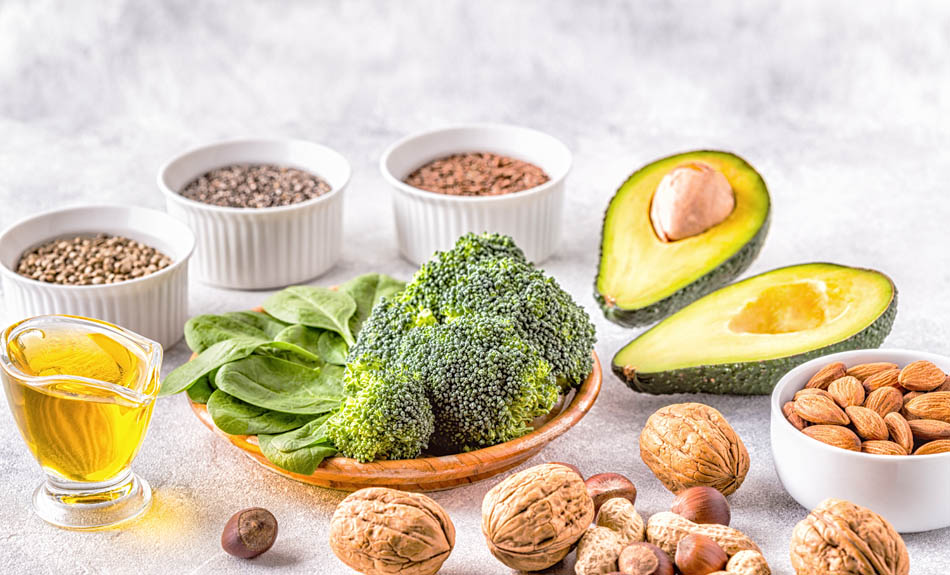
High cholesterol? The right foods can help you better manage bad cholesterol and reduce your risk of heart disease.
Cholesterol is a type of fat that your body needs to function well. A waxy substance, cholesterol travels through your bloodstream as a component of low-density lipoprotein (LDL) and high-density lipoprotein (HDL).
Lipoproteins are soluble proteins that combine with lipids in the blood plasma. They then transport lipids to where they are needed in the body.
LDL cholesterol can lead to a buildup of fatty deposits in blood vessels. These deposits may interfere with normal blood flow.
High LDL cholesterol levels are associated with a greater risk of stroke and heart attack. This is why LDL cholesterol is called bad cholesterol.
Read on to discover healthy foods that can help lower LDL cholesterol and promote good HDL cholesterol levels.
Best Foods That Will Lower Your Cholesterol You Should Try Right Now
Many foods can lower LDL cholesterol, including most types of beans, lentils, and split peas. Veggies and fruits high in soluble fiber also have a cholesterol-lowering effect.
From carrots and eggplant to sweet potatoes and broccoli, you are spoiled for choices.
Most fruits can reduce bad cholesterol, so you can’t go wrong eating more of them. Apples, grapes, bananas, citrus fruits, and even avocados are all great choices.
Lowering cholesterol doesn’t mean you have to give up on snacks. You can replace unhealthy snacks with nuts and berries. Almonds, walnuts, and peanuts are great choices.
Let’s dive into the foods that will help you to lower your cholesterol!
Beans and Legumes
Beans and legumes have soluble fiber, a type of fiber found in plant foods. Soluble fiber binds to cholesterol in the intestine. Doing so helps remove it from the body.
Fact: Eating 5–10 grams of soluble fiber every day can lower LDL cholesterol levels.
Beans also have omega-3 fatty acids. A filling food, they can make you feel full for longer. They are also a rich source of protein.
But keep in mind that canned or baked beans and legumes often have a high salt content. This may increase your blood pressure. They may also have fewer proteins than beans and legumes you cook at home.
Baking, boiling, or sprouting beans are all healthy ways to enjoy beans. But don’t forget to soak them overnight before cooking.
Dry beans have antinutrients such as lectins and tannins that reduce the absorption of nutrients. Most antinutrients are in the skin of the beans. They are soluble in water. Hence soaking the beans overnight helps remove antinutrients.
Good to know: Eaten with whole-grain rice, beans and legumes provide a complete protein source, giving your body all the essential amino acids it needs to function well.
#1 Kidney beans
In a 2021 study, participants with high LDL cholesterol ate one cup of canned beans a day. After 4 weeks, they had lower bad cholesterol levels.
A 100-gram serving of boiled kidney beans or red beans packs 6 grams of fiber. And with that, over 8 grams of protein.
Kidney beans are not the only type of beans you can eat to improve cholesterol levels. Just about all other types of beans bring the same health benefits.
So make sure to try out black beans, cannellini beans, and black-eyed peas. And don’t forget about pinto beans and lima beans.
#2 Soybeans
Eating 25 grams of soy protein per day for 6 weeks lowered LDL cholesterol levels, according to a meta-analysis of 46 studies. You can get soy protein from tofu, tempeh, or soy milk.
But cooking and eating whole soybeans is best. Boiling soybeans before use does take a few hours. But you get more nutrients and more value for what you spend.
You can add soybeans to masalas, curry, and salads. Or simply eat them as a side dish with rice.
#3 Chickpeas
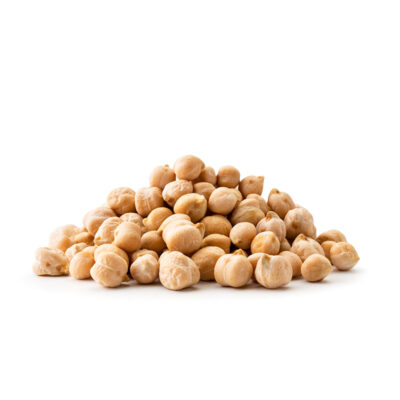
A randomized controlled trial found that participants who ate chickpeas for 5 weeks had lower total cholesterol and LDL cholesterol. One cup of boiled chickpeas has 12 grams of dietary fiber and 14.5 grams of protein.
Chickpeas are a nutritious side dish; you can add them to stews, soups, pasta, or sandwiches. You can also mash or blend chickpeas into hummus.
However, keep in mind that processed hummus may have added oils high in saturated fats. These could increase your total cholesterol levels. Better make your own hummus with unsaturated fat oils low in cholesterol. Think canola oil or olive oil.
#4 Lentils
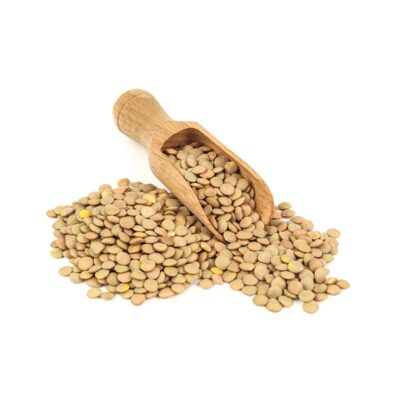
A 2014 review of several controlled trials found that eating 130 grams of lentils or other pulses a day significantly lowered LDL cholesterol levels.
One cup of boiled lentils packs 15.6 grams of fiber and 17.9 grams of protein, plus a consistent dose of iron, magnesium, and phosphorus.
Green lentils have a firmer texture, making them a great side dish. Red lentils are ideal for soups, stews, and dhals. You can also try lentil cookies as a healthy alternative to the average cookie.
#5 Split peas
Split peas are legumes that can effectively lower LDL cholesterol. By doing so, they may reduce the risk of heart attack or stroke.
They are a hearty source of soluble fiber and protein and a rich source of B vitamins, minerals, and phytonutrients such as phytates and isoflavones. The latter may lower blood pressure and support overall health.
Split peas are easy to store. You can integrate them into many different recipes. You can add them to soups or make them crisp and crunchy in a skillet. Or you can turn them into a dip or spread that goes great with whole-grain crackers.
Vegetables
Vegetables, together with fruits, don’t have any cholesterol. You can eat them without worrying that they will increase your LDL levels. Or that they may lower your HDL levels.
What’s more, vegetables have soluble fiber and antioxidants. Together, these can lower cholesterol and protect your heart from disease. Vegetables also have a low glycemic index and fewer calories than other foods.
Some veggies have added benefits. For example, garlic lowers blood pressure. This makes them ideal for a heart-healthy diet as well as for weight loss diets. If you’re trying to lower cholesterol and prevent cardiovascular disease, eating more vegetables is the way to go.
Some vegetables appear to be especially beneficial in managing cholesterol. Read on to discover the best vegetables you can eat to lower cholesterol and prevent heart disease.
#6 Spinach
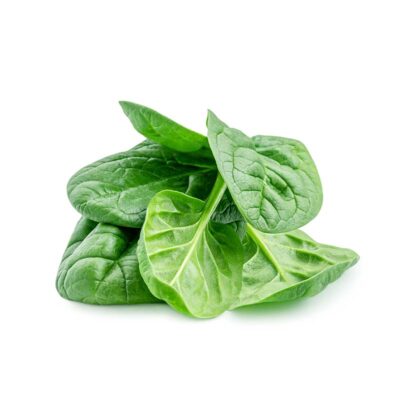
In itself, spinach has no cholesterol. But its positive effects on total cholesterol go beyond that.
Studies show that steamed dark leafy green vegetables like spinach reduce LDL cholesterol. What’s more, spinach is rich in carotenoids. These are antioxidants that can help neutralize free radicals that otherwise may harden your arteries.
Spinach is also a keto-friendly food you can incorporate into just about any type of diet. It also has a low glycemic index. This makes it very safe for people with type 2 diabetes.
Steaming spinach helps you take advantage of all its nutritional benefits. You can eat it with whole-grain pasta, add it to vegetable stir-fries, or put it in eggs. You can also blend it into shakes. And don’t forget about baby spinach: it’s a great base for salads!
#7 Carrots
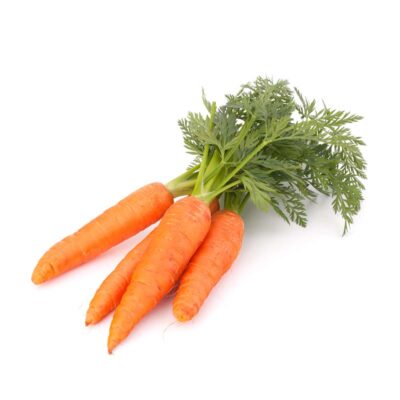
Carrots have a reputation as an eye health superfood because of their high vitamin A content. Vitamin A is one of the essential vitamins for eye health.
An animal study noted a significant decrease in cholesterol levels after 3 weeks of supplementation with carrots. More than modifying cholesterol absorption, carrots increase antioxidant levels.
Together, these effects of carrots on the body can help prevent heart disease and heart attack. Unlike other vegetables, the nutrient content in carrots increases during cooking. Boiling carrots is a healthy way to enjoy this perennial vegetable.
#8 Eggplant
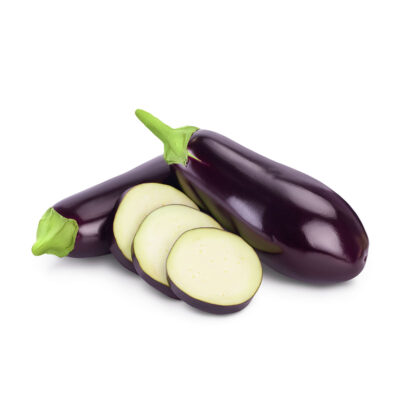
Eggplant often gets mentioned as one of the best vegetables you can eat to manage cholesterol, and for a good reason. Eggplant is rich in soluble fiber, which, as we’ve seen, can lower cholesterol levels. It’s also low in calories.
A study on rabbits with high cholesterol looked at the results of eggplant fruit juice supplementation. After 4 weeks, the rabbits had significantly lower cholesterol levels and had lower aortic cholesterol.
You can enjoy eggplant as a breakfast or lunch spread on whole-grain toast. Or you can add it to stir-fries, roast it to eat with pasta, or bake it crisp.
#9 Garlic
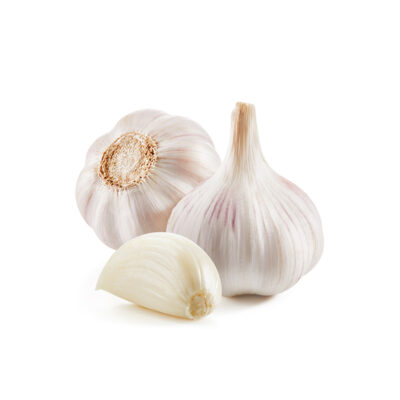
A 2016 meta-analysis found that garlic supplementation can reduce total cholesterol by up to 29.8mg/dL. What’s more, garlic lowers blood pressure and may prevent blood clots. This indicates that garlic has notable protective effects on the heart.
To maximize the effects of garlic on your cholesterol levels, consider taking an aged garlic supplement. According to research, these supplements are more powerful at lowering bad cholesterol than dietary garlic.
But that’s no excuse not to enjoy garlic daily. Whether it’s as a clove crushed into a salad or simply eating it raw with a whole grain sandwich.
#10 Brussels sprouts
One cup of cooked Brussels sprouts provides 4 of the recommended 28 grams of dietary fiber. And with that, you also get your daily recommended dose of vitamin C and vitamin K.
The latter plays an important role in blood clotting. But bear in mind that vitamin K may interfere with medication meant to prevent blood clots. Brussels sprouts are also a source of omega-3 fatty acids.
In the kitchen, Brussels sprouts are versatile. You can easily add them to soups and stir-fries for a healthy dose of soluble fiber, nutrients, and antioxidants. And you can always bake, roast, or saute them.
Tip: When Brussels sprouts are not in season, buy them frozen.
#11 Tomatoes
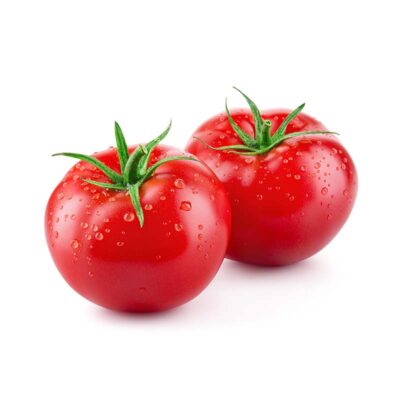
Tomatoes have lycopene and beta-carotene. A comparative study found that a high intake of tomatoes protects against atherosclerosis. It achieves this by lowering LDL cholesterol levels. Lycopene may also reduce the risk of certain cancers.
Atherosclerosis occurs when the arteries become clogged with plaque. It’s a risk factor for stroke, heart attack, and heart failure. High cholesterol itself is a major risk factor for atherosclerosis.
To take advantage of the health benefits of lycopene, cook tomatoes. Boiling or steaming increases their lycopene content.
Add tomatoes to soups, stews, pasta, rice, and stir-fries. You can also drink tomato juice or enjoy tomato sauce. But watch out when shopping for processed tomato products. They often have plenty of added sugars and salt.
#12 Bell peppers

Bell peppers are not just a fantastic source of vitamin C and antioxidants. They also have the carotenoids lutein and zeaxanthin. These contribute to keeping your cardiovascular system healthy.
Bell peppers have over 30 carotenoids as well as the flavonoids luteolin and quercetin. Japanese researchers found that luteolin and quercetin are among the most effective flavonoids at reducing LDL oxidation caused by free radicals. Oxidized LDL cholesterol can be especially harmful to health as it easily binds to arteries.
The best way to enjoy the health benefits of bell peppers is to eat them raw. Cooking them decreases their vitamin C content.
#13 Beets
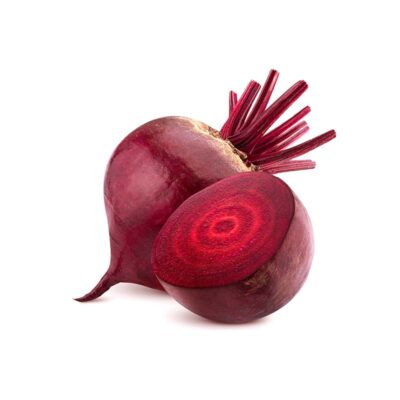
Beets have phytosterols, plant compounds similar to cholesterol. By getting these through your diet, you can promote the excretion of cholesterol and lower your body’s bad cholesterol levels.
Beets can also help lower blood pressure and decrease the risk of heart disease. This makes them one of the healthiest vegetables you can eat for supporting overall cardiovascular health.
Grate raw beets into salads. Blend them with Greek yogurt and spices to make a nutritious dip. Or add them to smoothies for a burst of nutrients and color.
#14 Asparagus
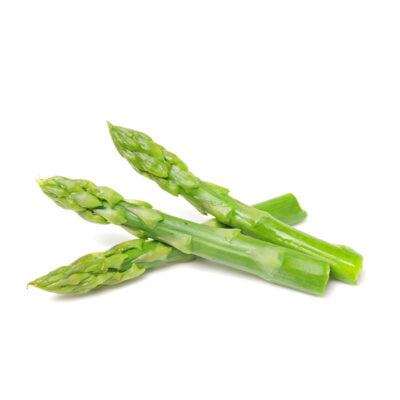
One cup of asparagus packs 3 grams of fiber and 3 grams of protein, as well as a variety of essential nutrients and antioxidants. The soluble fiber in asparagus binds to LDL cholesterol in the gut. This then gets excreted with your next stool.
Asparagus is also rich in potassium, which may decrease tension in blood vessel walls and lower blood pressure. It’s one of the heart-healthy vegetables you can eat more of.
You can steam, roast, or grill asparagus. Add it to stir-fries, pasta, and frittatas.
Did you know: There are over 300 varieties of asparagus, including green, white, and purple asparagus.
#15 Collard greens
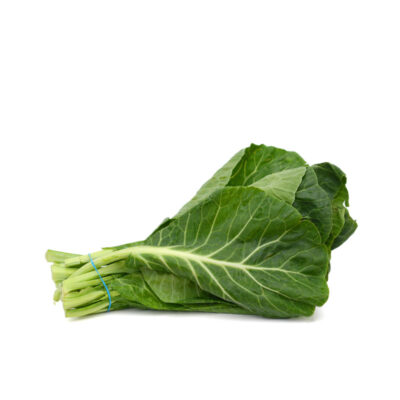
With their large green leaves and tough stems, collard greens look a lot like lettuce. They are, in fact, a variety of cabbage.
Like other leafy greens rich in soluble fiber, they are a dependable food for lowering cholesterol. Plus, you get a healthy dose of nutrients.
Collard greens also have vitamins A, C, K, and B6. They are a source of calcium, iron, and magnesium. Not sure how to eat collard greens?
Use them as wraps for vegetables or other foods that lower cholesterol. The sturdy leaves make them ideal for that.
You can also stir them into soups, stir-fry them alongside other veggies, and add them to salads. You can even puree them into a healthy and delicious pesto.
#16 Red onions
Animal studies indicate that red onions may lower bad LDL cholesterol while improving good HDL cholesterol. This is likely due to their antioxidant content, particularly quercetin.
A study of 54 women also found that women who ate 40 to 60 grams of onions a day had lower LDL cholesterol.
In addition to managing cholesterol levels, this suggests that eating red onions regularly could reduce the risk of heart disease.
Onions also have soluble fiber, vitamin C, folate, vitamin B6, and potassium. They preserve most of their health benefits when cooked too. So you have no excuse not to eat them more often.
#17 Cauliflower
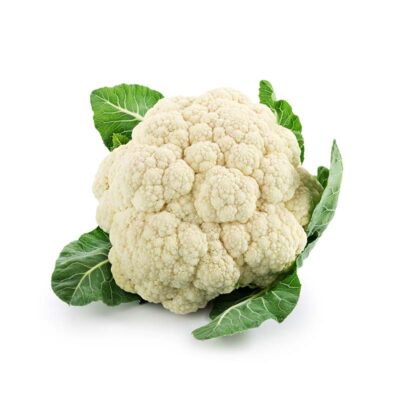
Cauliflower provides a powerful mix of soluble fiber, plant sterols, and antioxidants. Together, these work to reduce cholesterol levels and support overall health.
With its mild, slightly sweet taste, cauliflower is easy to add to your dishes. It can help you manage cholesterol levels without feeling that you’re sacrificing taste.
Cauliflower is low in carbs compared to grains or legumes. If you’re following a low-carb diet, you can use cauliflower as a smart replacement for other foods.
For example, you can make cauliflower hummus or vegetable dough for pizza. Or grate it to use instead of rice.
#18 Swiss chard
Next up, a leafy green similar to spinach and kale. It may not be the first that comes to mind when shopping for ingredients for your next meal. But eating it more often can help you manage cholesterol.
Swiss chard is high in soluble fiber, with one cup providing around 3.7 grams of fiber. It’s loaded with antioxidants, vitamins K and A.
Also, it’s a good source of vitamin C, magnesium, copper, and manganese. All of these nutrients are essential for your body to function well.
You can eat young leaves raw. For more mature leaves, think stews, soups, frittatas, and casseroles.
#19 Kale
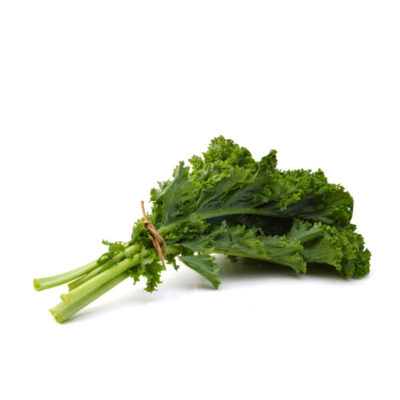
No list of cholesterol-lowering foods would be complete without kale. One of the most eaten leafy greens in North America, kale has bile acid sequestrants.
The liver turns cholesterol into bile acids. The sequestrants in kale bind to these acids in the digestive system, preventing them from being reabsorbed. The result can be lower cholesterol levels. And with it, a lower risk of heart disease.
More than its cholesterol-lowering abilities, kale is dense in nutrients. It’s loaded with vitamins A, C, and K, antioxidants, and essential nutrients.
To make the most of kale’s impressive health benefits, eat it raw or blend it into smoothies. But keep in mind that raw kale has goitrins, compounds that may interfere with thyroid functions.
Research indicates that you’d have to eat pounds of kale every day for months for goitrins to harm your thyroid. But if you have any concerns, you can steam kale.
#20 Broccoli
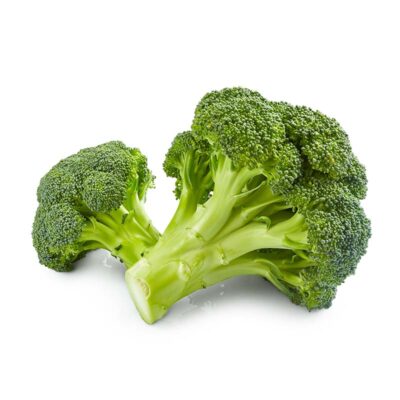
Broccoli is a constant presence on just about any list of healthy foods. And no wonder. With its mix of antioxidants, vitamins, and fiber, it’s one of the healthiest foods you can eat.
Broccoli is a great addition to a cholesterol-lowering diet. It has glucosinolates, compounds that lower low-density lipoprotein in plasma levels. Simply put, broccoli can reduce your risk of heart disease.
Steam broccoli rather than boil it to preserve more nutrients. Not to mention that steamed broccoli has a crisper, firmer texture and tastes richer.
#21 Okra
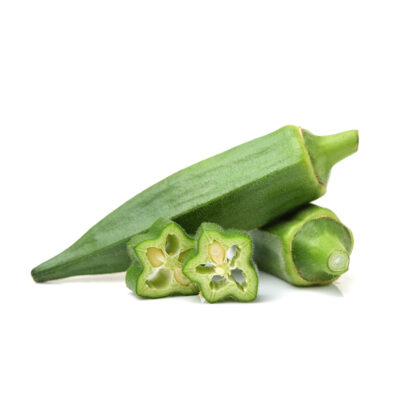
Okra may not be a common presence in your local supermarket. But when you come across these seed pods, don’t hesitate to get some.
Okra has mucilage, a gel-like substance that binds to cholesterol in the gut. This promotes the excretion of cholesterol from the body.
Findings from an animal study suggest that okra can lower total blood cholesterol. Okra is also rich in polyphenols, which could reduce the risk of heart disease.
Cutting okra and cooking it in water will make it a bit slimy. For a nicer texture, you can bake or saute it instead.
Fact: Okra is a fruit, but in cooking, it’s used as a vegetable.
#22 Sweet potatoes
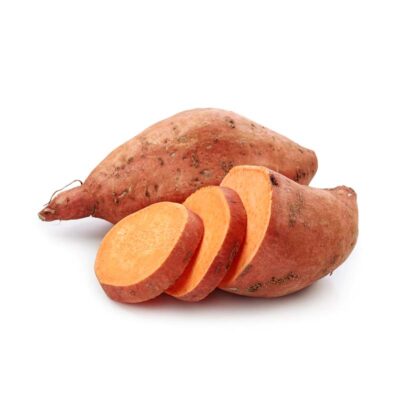
Although sweet tasting, sweet potatoes have fiber, beta carotene, and other antioxidants that can help lower cholesterol.
A 2013 study found that sweet potatoes can lower cholesterol in people with high cholesterol levels. It concluded that eating sweet potatoes regularly may help prevent cardiovascular disease and obesity and type 2 diabetes.
Steaming or boiling sweet potatoes is the best way to take advantage of their nutritional benefits. You can add sweet potatoes to salads or mash them into a puree. You can also turn them into crispy and delicious chips.
Tip: You can eat the sweet potato skin if properly cleaned and cooked. It has nutrients that otherwise get thrown away.
Fruits
Fruits are another important source of soluble fiber. Unlike foods derived from animals, fruits have no cholesterol. Not only that, but they are packed with antioxidants and vitamins.
Fruits are suitable for most types of diets. Even if you have diabetes, you can still eat fruits with a low glycemic index.
Most fruits are suitable for a diet aiming to lower cholesterol and heart disease risk. But certain fruits may be especially beneficial, whether through their soluble fiber content or the compounds they contain.
#23 Apples
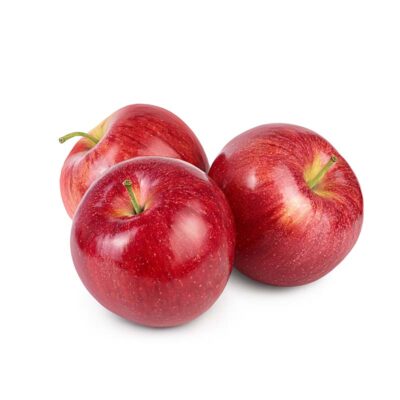
Studies of people with mildly elevated cholesterol levels found that apples may help decrease cholesterol. More specifically, eating two whole apples a day decreased LDL cholesterol and total cholesterol.
An older study on 160 women aged 45 to 65 also suggests that apples can lower LDL cholesterol. Participants in the study who ate 75 grams of dried apples a day for 6 months had 23% lower cholesterol.
Apples also managed to slightly increase good HDL cholesterol. These effects are likely due to pectic and polyphenols in apples. These fruits also have soluble fiber, another essential nutrient for managing cholesterol.
Good to know: Acids in apples may soften the enamel or outer covering of the teeth. Brushing right away may damage the enamel. Wait at least 1 hour after eating acidic fruits like apples before brushing.
#24 Red grapefruit
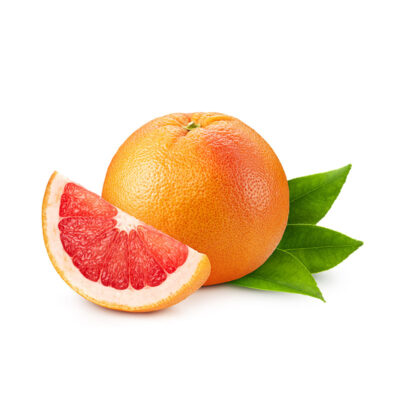
An Israeli study involving 57 patients with high blood cholesterol investigated the effects of red and white grapefruit on blood lipid levels.
Researchers found that patients who ate a single serving of grapefruit a day for 30 consecutive days had lower LDL cholesterol levels.
Red grapefruit, in particular, had a more positive effect than white grapefruit on lowering blood triglycerides. This is a type of cholesterol that can cause heart disease.
However, you don’t want to mix grapefruit with certain drugs that lower blood pressure or cholesterol. These include the statins atorvastatin, lovastatin, or simvastatin.
Grapefruit, whether whole or juiced, reduces the rate at which these statins become absorbed into the bloodstream. Grapefruit interacts only with some statins. If you have any concerns, talk with your doctor.
#25 Grapes
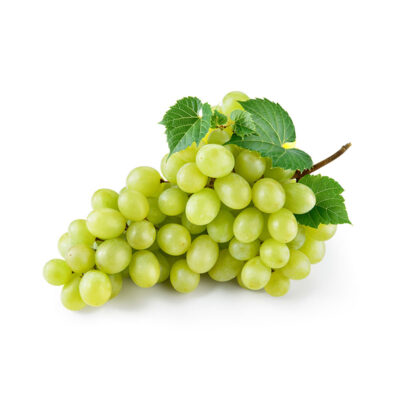
Green grapes have fiber and lots of phytonutrients. Combined, these can help lower cholesterol levels even as they boost your immune system. And since grapes also have potassium, they can help lower blood pressure and prevent heart disease.
Eating up to one cup of grapes a day can help you take advantage of their health benefits without the risk of acidity in the stomach.
The antioxidant levels of various grape types might vary. So you might wish to experiment with different types.
#26 Bananas
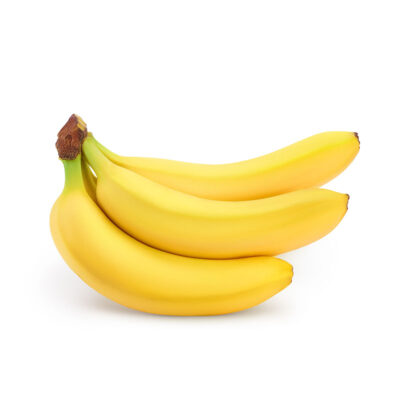
Can eating bananas regularly really improve cholesterol? A 2014 randomized controlled trial suggests a positive answer. The study involved participants with high cholesterol levels as well as participants with type 2 diabetes.
Subjects who ate between 250 and 500 grams of banana for breakfast for 12 weeks had lower LDL cholesterol and blood glucose levels.
While you can also enjoy a banana whole, don’t forget that you can add it to oatmeal, fruit bowls, or peanut butter sandwiches.
Avoid an upset stomach by eating ripe bananas. If you buy them green, store them at room temperature rather than in the fridge to allow them to ripen.
#27 Mandarins
Mandarins have fiber and pectin, a combo that helps prevent your body from absorbing bad cholesterol. They also happen to be delicious and easier to peel than oranges or grapefruit!
A medium-sized mandarin also packs a good dose of vitamin C. And, like all brightly colored fruits, it’s rich in antioxidants.
Filling your kitchen fruit bowl with mandarins can add more variety to your fruit snacks. They are a great way to eat more citrus fruits other than oranges and grapefruit.
And if you’re ever in doubt between orange juice and eating a whole mandarin, always choose the latter. Juice has fewer fiber and nutrients than whole fruits.
#28 Limes
A 2017 animal study found that a mixture of lime juice and honey significantly decreased LDL cholesterol. At the same time, it improved good HDL cholesterol.
Want to avoid the calories and blood sugar spikes that come with honey? You can simply drink lime juice instead. It has a positive effect on cholesterol levels.
Next time you need a refreshment, choose limeade over other drinks. More than helping you manage cholesterol levels, it tastes great.
#29 Pomelos
A large citrus fruit from Asia, pomelo tastes like a mild white grapefruit. It has fiber, antioxidants, and potassium. Together, these support heart health by helping to reduce LDL cholesterol and lowering blood pressure.
Like all citrus fruits, pomelo is also loaded with antioxidants that have many beneficial effects on the body. A healthy intake of antioxidants can even keep your skin looking healthy for years to come.
Important: Pomelo is related to grapefruit. Similar to the latter, it may interfere with statins-based cholesterol drugs and other medications. If you are taking medication, ask your doctor if eating pomelo is safe.
#30 Oranges
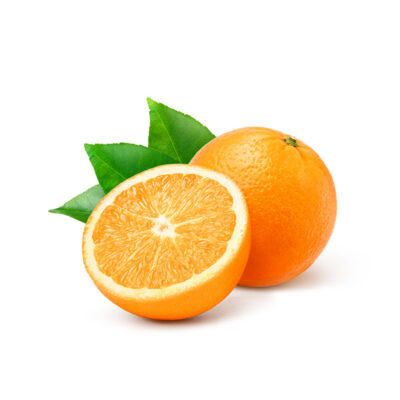
Oranges are another citrus fruit that contains plant sterols. As we’ve seen, plant sterols help prevent the absorption of cholesterol in the digestive system.
But before you reach out for a glass of orange juice, remember that eating oranges whole is healthier. Whole oranges have fiber, which helps control cholesterol levels.
They are also richer in nutrients and have a lower glycemic load, so you don’t have to worry about spiking blood sugar levels.
#31 Avocados
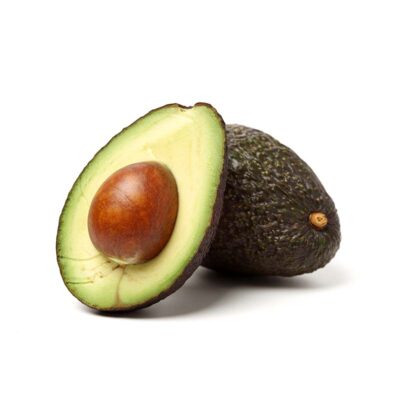
A 100-gram serving of avocado has 14.7 grams of fat. So how come a fruit so rich in fat has made it into our list?
Avocados have no cholesterol, are rich in omega-3 fatty acids, and have monounsaturated and polyunsaturated fats. These healthy fats can actually lower blood cholesterol levels.
What’s more, research suggests that the mix of fiber and phytonutrients in avocado can lower LDL cholesterol levels. Avocado is one of the best sources of healthy fats you can eat.
Making guacamole out of avocados is one of the simplest ways to add this heart-healthy fruit to your diet. Another is to simply cut the avocado into small pieces, spice it, and add it to toast or sandwiches.
#32 Sweet cherries
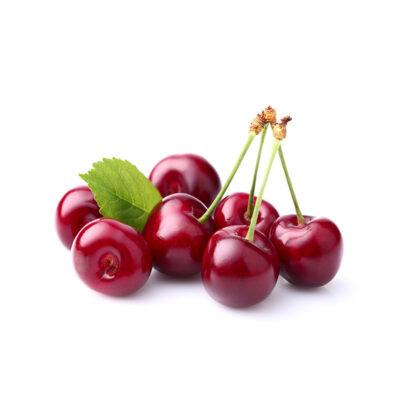
One cup of raw sweet cherries provides 3 grams of soluble fiber, according to the USDA. With that also comes a good dose of vitamin C and potassium.
A 2017 study lists cherries as one of the fruits that can help prevent heart disease. Cherries are very good for your heart because of anthocyanins, catechins, flavonols, and other antioxidants.
These promote a heart-healthy diet by lowering inflammation and protecting against cellular damage. Compared to other snacks, cherries may help lower blood pressure.
Eat cherries fresh to enjoy all their health benefits. You can also add them to smoothies, fruit salads, and baked goods.
Berries
We already talked about fruits, but berries deserve a category of their own. A 2016 meta-analysis found that berries significantly reduce LDL cholesterol levels.
Through their effect on cholesterol, berries decrease cardiovascular disease risk factors. Berries are packed with antioxidants and vitamins that help support overall health, including eye health.
#33 Blackberries
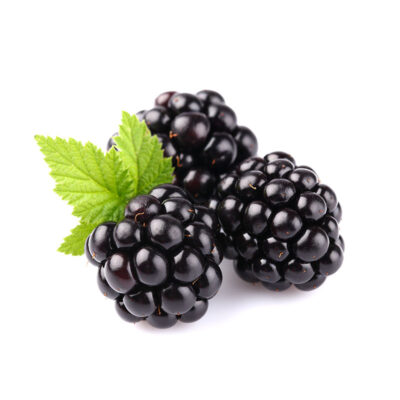
Studies indicate that blackberries have the most powerful effect on decreasing cholesterol levels. Blackberries concentrate more anthocyanins and other antioxidants than other berries.
Blackberries are also high in soluble fiber and vitamin C. And because of their low glycemic index, you can safely add them to just about any diet.
When shopping for blackberries, look for varieties that grow in the wild. These are often smaller and darker than cultivated varieties. And pack more nutrients, too!
#34 Strawberries
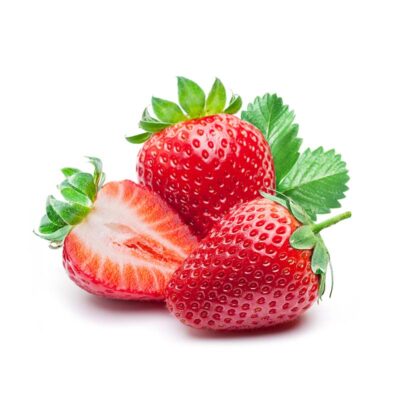
Strawberries can be safely integrated into a cholesterol-lowering diet. Strawberries reduce oxidative damage associated with LDL cholesterol. These red berries also help to maintain lower blood lipids.
In addition to soluble fiber, strawberries have vitamin C, folate, manganese, and potassium. The latter plays a key role in regulating blood pressure. Strawberries also pack important antioxidants like anthocyanins and ellagitannins.
#35 Blueberries
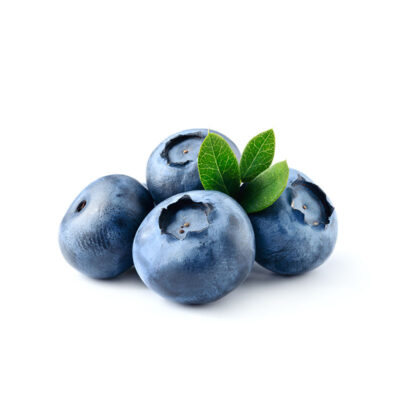
More than potent antioxidants, blueberries have plant sterols and soluble fiber. A 2013 controlled trial found that exercising and eating blueberries increased HDL cholesterol while reducing triglycerides.
Blueberries have more antioxidants than other berries. This is especially true of blueberries that grow in the wild. Cultivated varieties have fewer antioxidants.
A great way to integrate blueberries into a cholesterol-lowering diet is to sprinkle them over oatmeal and add some soy milk. A 100-gram serving of oatmeal has 15.4 grams of fiber. You can also add them to smoothies and fruit salads.
#36 Raspberries
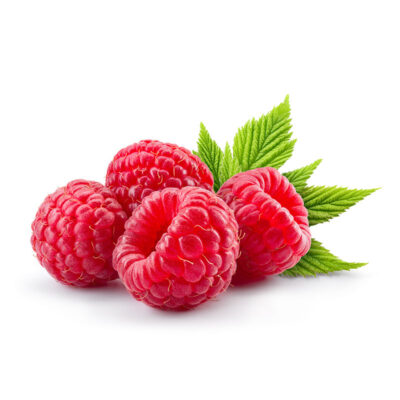
Raspberries are more than delicious. A 100-gram serving provides 6.5 grams of fiber and a healthy dose of vitamin C.
What’s more, a study in overweight and obese mice found that raspberries can reduce inflammation and oxidative stress.
Raspberries have a short shelf life, but that shouldn’t be an excuse not to eat them. You can also buy them frozen to enjoy them year-round.
Nuts
Nuts are rich in fat, but that doesn’t mean you should shy away from them. Nuts have unsaturated fats, fiber, and other compounds that can lower blood cholesterol. They are also rich in omega-3 fatty acids.
And since they can also lower blood pressure, they are a handy addition to a heart-healthy diet. Substituting unhealthy snacks for nuts could lower your risk of heart disease. It may even help overweight and obese adults lose weight.
If you want to follow a moderate-fat diet, nuts should be on the menu. But keep in mind that nuts have lots of calories plus saturated fat.
Plan your portions to maintain a healthy weight. Overeating nuts is very easy, especially if they are salted!
#37 Almonds
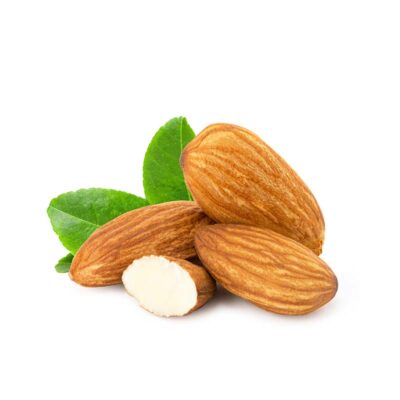
A meta-analysis of randomized controlled trials concluded that almonds can reduce blood pressure. Almonds are also capable of lowering cholesterol levels.
What makes almonds so healthy? In addition to fiber, almonds are loaded with antioxidants and phytochemicals. They have unsaturated fats, omega-3 fatty acids, vitamin E, and magnesium.
All of these are necessary for your body to function well. To boot, vitamin E may prevent blood clots.
And since almonds are packed with protein, they are filling as well. Snacking on almonds can reduce hunger and promote weight loss.
Good to know: Soaking almonds doesn’t appear to make them easier to digest. However, it can make them softer and easier to eat. It can also help your blender process them more easily into almond milk.
#38 Peanuts
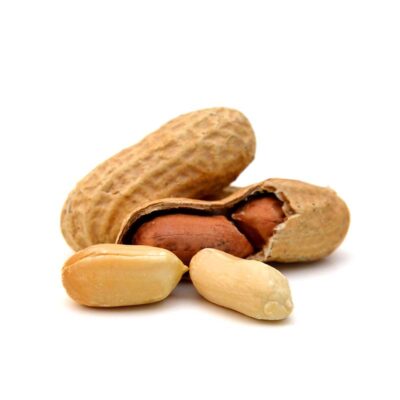
Peanuts have fiber and plant sterols, making them a dependable food if you want to lower blood cholesterol. Like almonds and other nuts, they have healthy fats. These can lower the risk of heart disease.
But watch out for salted peanuts. A high sodium intake can be a risk factor for high blood pressure and vascular disease.
Peanut butter is a great way to enjoy the health benefits of peanuts. But watch out for added ingredients. Buy or make your own natural peanut butter without added salt, palm oil, or sweeteners.
#39 Walnuts
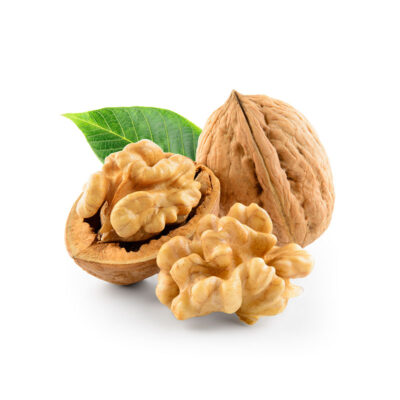
Eating half a cup of walnuts every day can reduce low-density lipoprotein cholesterol, according to research on older adults. With walnuts on your menu, you can keep cardiovascular disease at bay more easily.
Walnuts have omega-3 fatty acids and polyphenols, both of which are essential for brain health. They also have fiber, a 100-gram serving providing 6.7 grams of fiber.
And since walnuts are keto-friendly, you can eat them while keeping your carb intake in check.
#40 Hazelnuts
If the taste of hazelnuts is not persuasive enough, their health benefits certainly are. A diet that contains hazelnuts can decrease LDL and total cholesterol, according to a 2016 study.
Hazelnuts have omega-3 fatty acids, which support overall heart health. And plenty of fiber and protein to make them a nutritious meal.
But as with any other nuts, you don’t want to overindulge in them. Keep your portions small.
#41 Cashew nuts
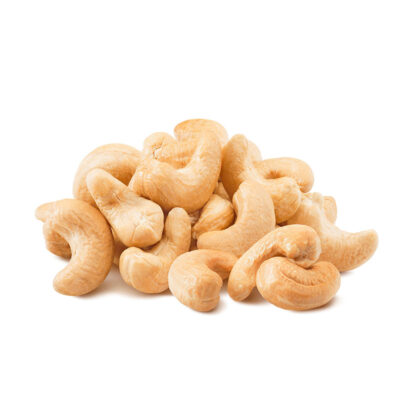
Sweeter and milder in taste than other nuts, cashews are another food that can lower LDL cholesterol.
A 2017 randomized controlled trial investigated the effects of the daily consumption of cashews instead of a high-carb snack. Researchers found that cashews reduced both total cholesterol and LDL cholesterol.
Cashews are one of the foods you can add to your diet if you want to manage your cholesterol more easily.
#42 Brazil nuts
Brazil nuts are rich in monounsaturated fatty acids, which can reduce your risk of heart disease. But more is not necessarily better with this food.
A 2013 study found that participants who ate 20 grams of Brazil nuts showed a sharper drop in LDL cholesterol than those who ate 50 grams. At the same time, they also experienced a more marked increase in HDL cholesterol.
Brazil nuts also have plenty of dietary fiber and protein. And they are a rich source of magnesium.
#43 Pistachios
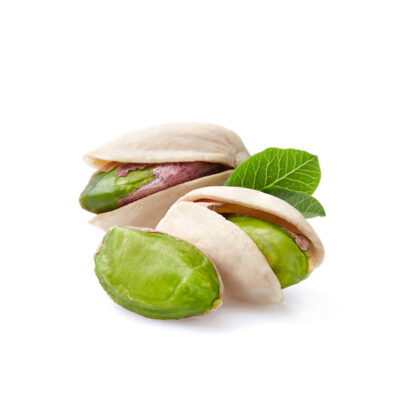
Our list of heart-healthy nuts continues with pistachios. Research suggests that pistachios can reduce cholesterol in people with higher levels than normal. Through its effects on cholesterol, pistachios may decrease the risk of coronary disease.
Snacking on pistachios is not the only way to enjoy these nuts. After shelling them, you can chop them to add over salads. You can also grind them into sauces or add them to baked bread or desserts.
Like all nuts, pistachios are nutritious and filling. They pack a hefty dose of soluble fiber and protein.
#44 Pecans
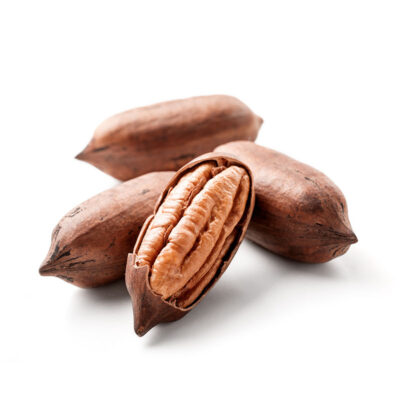
Originating in North America, pecans taste great and are easy to shell. They also lower cholesterol levels, according to science, though more studies are necessary to understand why.
Pecans are a versatile nut you can easily integrate into your diet. You can eat them in trail mixes, add them to oatmeal, salad, or yogurt. You can also toast them for more flavor.
Tip: Since nuts are high in fiber, drink a glass of water or other healthy drink after a serving. It will help prevent bowel problems.
#45 Macadamia nuts
Yet another nut that can lower cholesterol, macadamia provides a good dose of soluble fiber and protein. Studies indicate that it can reduce the risk of heart disease.
But remember that it also has saturated fat. A 100-gram serving of this nut provides more than half of the daily recommended value of saturated fats. In other words, a bit too much.
Roasting nuts may reduce their nutrient content. So it’s better whenever possible to eat them raw.
A Word From Our Nutritionist
By contrast, HDL cholesterol is beneficial. It absorbs other forms of cholesterol in the blood and transports it to the liver. The liver, in turn, removes the cholesterol from your body.
By removing bad cholesterol from the bloodstream, “good” HDL cholesterol may reduce the risk of heart disease and stroke.
To manage cholesterol, eating foods that can lower cholesterol is not enough. You have to reduce your intake of high-cholesterol foods. The fewer saturated fats and the more omega-3 fatty acids you eat, the better.
Cut unhealthy fat from the menu. Follow a moderate-fat diet instead. Eat more extra virgin olive oil, fatty fish, and other healthy fats. Avoid drinking too much alcohol.
The Mediterranean diet is a great example. It has proven health benefits in overweight and obese adults.
In conclusion, the right food choices can complement any cholesterol-lowering treatment. Focus on foods with plenty of soluble fiber and plant sterols.
Takeaways
Before you go shopping for foods for a heart-healthy diet, here are some things to remember.
- Foods high in soluble fiber and plant sterols can lower LDL cholesterol and the risk of cardiovascular disease.
- Cholesterol-lowering foods include many delicious fruits, veggies, and nuts.
- A healthy low-cholesterol diet is balanced. Don’t eat just one or two cholesterol-lowering foods.
- Eat a rainbow of cholesterol-busting foods.
- Eat fewer dairy products and more whole grains.
- Avoid foods high in saturated and trans fats.
- Aim to eat more heart-healthy omega-3 fatty acids as part of a cholesterol-lowering diet.
In the end, to prevent your body from absorbing cholesterol, choose foods you enjoy. That will make it easier to stick to your diet.
Leave a comment

















































 Select your language:
Select your language: 






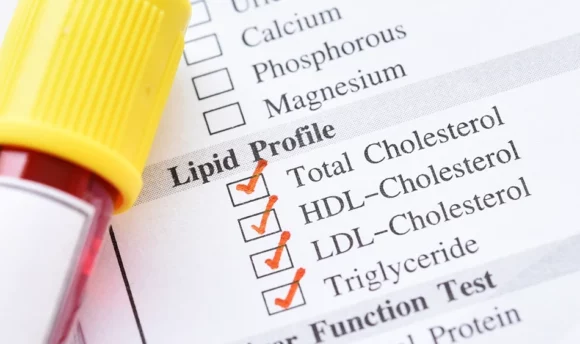


An invaluable article with helpful information. Thank you
Catherine